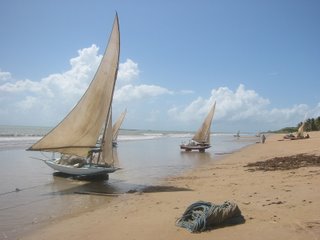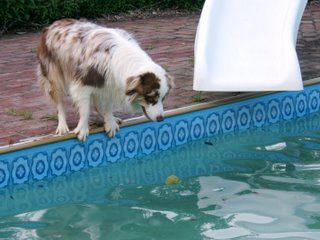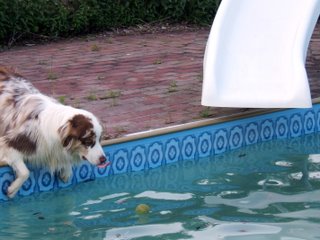22 October 2006
The handsome dog in the foto vignette at the end of this Post is an Australian something or other. He belongs to the children of my daughter Amy. He is smart enough to know that if he jumps in after the ball it will skitter away. He who waits and wades often wins!
2a) ODDS & ENDS
I would be caught dead jogging.
Why is it that whatever hits the fan will not be evenly distributed?
Uncharacteristically, he jumped to his death.
Guantanamo Bay - Trial and Terror
- - -
2 b) RIO GRANDE do NORTE (RN)
Natal (christmas in portugues), now the capital and the largest city in the state of RN, was one of the first European settlements in the northeast. The village which grew to be our city, was established December 25th, 1599. It is on the South Atlantic at the mouth of the Potengi river. On your map you will find it on the big hump on the northeast coast of Brasil closest to Africa. We are about 5° below the equator.
French pirates ‘occupied' Natal in the 1590’s. They "traded" with the native Portiguars - a name which is still used to characterize folks born here.
The French were driven out by the portugues in 1597 leaving no traces. The still standing Forte dos Reis Magos (named after the biblical three wise kings) was built in 1598-99 to guard the harbor and mouth of the river. I think it the most interesting historic site in Natal.

Later the Dutch occupied the village and the fort for a few decades before they too were shoved out by the Portugues. Many of the dutch settlers fled inland and are said to be the reason some of todays inland brasileiros have green eyes, fair skin and wonderful smiles.
The major economic activity in RN in the first three hundred years was cattle raising in large “fazendas” (ranches) in the desert country in the interior. From this ‘crop’ came ‘jerked beef’ here called carne de sol. I think the cattle walk hundreds of kilometers to the slaughter house which gives the meat its tough, jerky consistency . . . good though!
In the 18th century salt became a major crop; large ponds were flooded with ocean water at high tide, then allowed to dry out in the hot sun; the residual salt was ‘harvested’. This is a traditional, world-wide salt farming method: I’ve seen remainders of similar ponds in Provincetown on Cape Cod.
Petroleum became a major "crop" in the 19th century. RN has Brasil’s largest inland reserves of 'oleo'. Today, the coastal waters of the South Atlantic off Brasil are the major source of petroleum. Using a combination of oleo, alcool (gasoline, alcohol) and stiff prices, Brasil has become self-sufficient in automotive fuel. Other important crops in RN are fishing and shrimp farming.

Fishing Boats - Foto by Mike
During World War II the US built a major airport here which was manned by a few thousand American soldiers. It was used as a ferrying station: Florida <> Natal <> Africa <> Europe. Many of the soldiers married brasileiras; some remained in Brasil, others took their new wives to stateside. There are pictures of President Roosvelt in Natal on his way to and fro from a World War II conference in Europe. Today it is Natal’s modern, Augusto Severo Aeroporto.
Natal - Cidade de Sol - welcomes about 2,000,000 tourists to its shores every year. The delightful, year around climate and 250 kilometers of adjacent ocean beaches are the major attraction. Wind surfing is consistently good and it is the world center of Dune Buggy rides or, if you are choosy, you can lurch around on a camel. Offshore, the island of Fernando de Noronha is one of the world's finest locations for underwater diving. Eco Tourism is growing; despite cuttings, the northeast has by far the largest tropical forest in the world.
Sorry, but the weather here is near perfect. Ten minute rain showers come and go now and again but a hard days rain rarely falls; maybe three or four isolated days in the winter (July, August, September) . Reported research verifies that the air quality here is the best of any major city in the world. My emphysema-blessed lungs think it is fun to breath.

The temperature ranges between 75° and 95°. Onshore breezes from the South Atlantic sharply reduce the humidity; nope, no hurricanes. Inland the northeast of Brasil is desert - think Arizona. Here on the littoral there are fine beaches in a people friendly city; not perfect, but aside from Soggytrees, N.Y. what city is?
The city has about 800,000 people, the majority earn a low-minimum wage, or less; a middle class that is growing, slowly, and a small number of rich who, as is their wont, manage. While this overall pattern is similar to those in the US, Europe and elsewhere, there are proportionately more poor here and the middle class is smaller.
Folks from Europe tourist in Natal and buy vacation condos; some retire here. Brasilian tourists come up from Rio de Janeiro to avoid mobs of foreign tourists. There are few americanos, largely because they tend to dead-end in Mexico or the Caribbean Islands. The latter are a lot closer to home and the resorts there cater to the americano preference for americanos.
2c) POEMS
One of the worlds great poets is Wistawa Szymborska, winner of the Noble Prize for Literature in 1996. Robert Hass, fine American poet, observed, “She is unquestionably one of the greatest living European poets. She’s accessible and deeply humane and a joy––though it is a dark kind of joy." I admire her work immensly.
THE END AND THE BEGINNING
After every war
someone has to tidy up.
Things won’t pick
themselves up, after all.
Someone has to shove
the rubble to the roadsides
so the carts loaded with corpses
can get by.
Someone has to trudge
through sludge and ashes,
through the sofa springs,
the shards of glass,
the bloody rags.
Someone has to lug the post
to prop the wall,
someone has to glaze the window,
set the door in its frame.
No sound bites, no photo opportunities,
and it takes years.
All the cameras have gone
to other wars.
The bridges need to be rebuilt,
the railroad stations, too.
Shirtsleeves will be rolled
to shreds.
Someone, broom in hand,
still remembers how it was.
Someone else listens, nodding
his unshattered head.
But others are bound to be bustling nearby
who’ll find all that
a little boring.
From time to time someone still must
dig up a rusted argument
from underneath a bush
and haul it off to the dump.
Those who knew
what this was all about
must make way for those
who know little.
And less than that.
And at last nothing less than nothing.
Someone has to lie there
in the grass that covers up
the causes and effect
with a cornstalk in his teeth,
gawking at clouds.
- - -
Check your library: Wistawa Szymborska, Poems New and Collected
= = =
2d) FOTO VIGNETTE
"I want that ball!"







4 Comments:
Seems a shame to see a big 0 for number of comments, so let mine be the first. Aside from a few spelling mistakes, the descriptions of Natal were most interesting. Keep up the good work.
I liked the one about driving in Natal! I didn't know about the racing! Also your two poems!
suzy
What an event....sex taken less seriously....liked the new notes. Enjoy the pictures. I am glad you had a family to spend time with on Christmas.
A good read on Christmas 2017. I miss you.
Post a Comment
<< Home